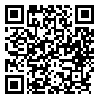BibTeX | RIS | EndNote | Medlars | ProCite | Reference Manager | RefWorks
Send citation to:
URL: http://jdm.tums.ac.ir/article-1-5584-en.html
2- Dental Student, School of Dentistry, Rafsanjan University of Medical Sciences, Rafsanjan, Iran
3- Assistant Professor, Department of Epidemiology, School of Public Health, Rafsanjan University of Medical Sciences, Rafsanjan
Background and Aims: The purpose of this study was to evaluate the relationship between the mandible anatomy with age and gender in panoramic radiography of patients.
Materials and Methods: In this descriptive-sectional study, 322 panoramic radiography of patients at the age of 25-55 years old were evaluated. The patients were devided in three groups of 25-34, 35-44, 45-55 years old and the radiomorphometric indexes in panoramic radiography of the patients were measured. The collecting data were analyzed using independent two-sample t-test, one-way anova and multiple linear regression using SPSS statistical software (version 18).
Results: The average of radiomorphometric indexes don’t show a meaningfull statistical defference between different age groups. The average of all angles higher in females than that of males and other measured indexes were higher in males than females. Also, the mandibular foramen moved forward with the increase of age.
Conclusion: Based on the result of this study which was done on limited numbers, it can be concluded that the measured radiomorphometric indexes in this study didn’t have a high accuracy to predict Age and Gender.
Received: 2017/04/5 | Accepted: 2017/04/5 | Published: 2017/04/5
| Rights and Permissions | |
 |
This work is licensed under a Creative Commons Attribution-NonCommercial 4.0 International License. |




